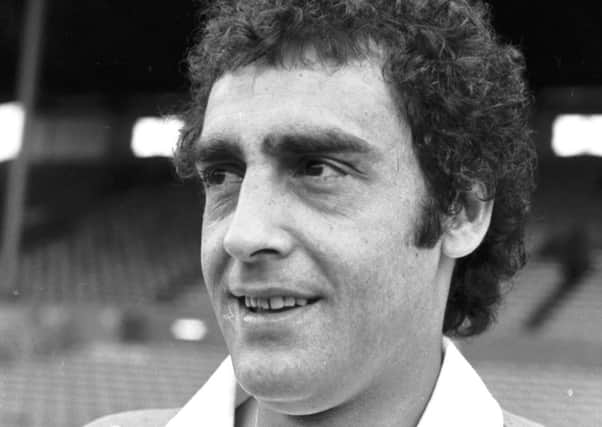Obituary: Paul Wilson, Celtic star and only non-white player to win a Scotland cap in the 20th century


PAUL Wilson, who has died suddenly, aged 66, was unique among the 727 players who won full Scotland caps during the 20th century. He was the solitary non-white amongst that number and the first non-white to be capped by Scotland since Andrew Wilson in 1881.
When he had his literal 15 minutes of international fame, as a 75th minute substitute against Spain in a European Championship qualifier in Valencia, on 5 February, 1975, he beat, by a full three years, Viv Anderson’s better-documented feat in being the first black player capped by England. It would be 29 years after Wilson’s solitary cap before Scotland next capped a non-white player – Nigel Quashie.
Advertisement
Hide AdAdvertisement
Hide AdWilson’s background was certainly exotic. He was born in India, where his Scots/Irish father, an RAF serviceman, met his Indian mother, who was from a Dutch/Portugese background, so Wilson was eligible to play for countries other than Scotland.
The Wilsons arrived in Glasgow when Paul was one, and he was brought up in Dennistoun. The Wilsons then moved to Milngavie, and he attended St Ninian’s High School in Kirkintilloch.
He was still attending school when he was signed by Celtic in December 1967. Jock Stein immediately farmed him out to Maryhill Juniors and it would be 1970 before he made his first-team bow; coming off the bench to score in a 5-1 Scottish League Cup quarter-final second leg win over Dundee at Celtic Park.
He was a member of the legendary Quality Street Gang, the young Celtic reserve side which also included fellow future Scotland caps Danny McGrain, Davie Hay, George Connelly, Kenny Dalglish and Lou Macari and which, in £1 per head side bet games, would regularly beat the Lisbon Lions first team.
However, it wasn’t until 1973 that he forced his way into the first team with any degree of regularity.
He earned his stripes and, in season 1974-75, as well as winning that solitary Scotland cap, he created a record when he scored in four different Hampden cup finals.
In August, he netted in the Drybrough Cup Final against Rangers; in October, he was on target again in the League Cup final against Hibs, then, in May, he scored in the Scottish Cup final against Airdrie and the Glasgow Cup final against Rangers. He led the Celtic scorers that season, with 29 goals, ahead of Dalglish and ‘Dixie’ Deans.
However, the season ended sadly for him, when his mother succumbed to cancer, passing away in the week leading up to the Scottish Cup Final, in which he scored twice. He admitted that the fun went out of football thereafter.
Advertisement
Hide AdAdvertisement
Hide AdHe enjoyed a good relationship with Stein, who made full use of the fact that Wilson kept his very best form for the Old Firm clashes with Rangers, where the racist invective he had to endure seemed to spur him on.
That said, derogatory references to his colour were not restricted to Rangers’ fans.
Wilson always maintained he didn’t think too deeply about the abuse, which was commonplace in the 1970s, and his colour or background was never an issue with Celtic.
Indeed, one former team mate confessed this week: “I thought Paul was one of these guys who took a great tan, until the day I had to pick him up from his parents’ house and this very obviously Indian lady answered the door and Paul introduced her as his mother.”
He said, in a 2014 interview with The Scotsman’s Andrew Smith, that Stein encouraged him not to rise to the baiting, but to “answer them by scoring against their side”, something Wilson proved to be adept at.
When Stein left, he had a less easy relationship with former team-mate Billy McNeill and, in September 1978, after 217 games and 55 goals, he left Celtic Park for Motherwell in a £50,000 transfer.
With Celtic he played in six League-winning sides, won four Scottish Cups, one League Cup, the Drybrough Cup and the Glasgow Cup during his 11-year career at the club.
He played two years at Motherwell, before running down his senior career with Partick Thistle. He was still only 29 when he retired.
Advertisement
Hide AdAdvertisement
Hide AdWilson was married twice, firstly to Liz, with whom he had sons Barrie and Paul, then, after that marriage broke down, he married Joy, who survives him with daughters Ceri and Katie.
After football, he entered the licensed trade, but three years later, Jimmy Johnstone persuaded him out of retirement to play alongside him for junior side Blantyre Celtic.
He showed he still had it by adding a junior Scotland cap to his senior one – uniquely among those players capped at both junior and senior level by Scotland, Wilson is the only one to have won his senior cap first.
His final job, before retiring, was with a motor parts company.
MATT VALLANCE